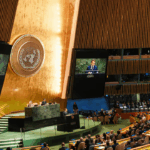
Dozens of world leaders gathered at the United Nations on Monday to embrace a Palestinian state, a landmark diplomatic shift nearly two years into the Gaza war that faces fierce resistance from Israel and its close ally, the United States.
President Emmanuel Macron announced that France would recognise Palestine’s statehood at a meeting he convened with Saudi Arabia — a milestone that could boost Palestinian morale but appeared unlikely to change much on the ground.
The most far-right government in Israel’s history has declared there will be no Palestinian state as it pushes on with its fight against militant group Hamas in Gaza following the October 7, 2023, attack on Israel that killed some 1,200 people.
Israel has drawn global condemnation over its military conduct in Gaza, where more than 65,000 Palestinians have been killed, according to local health authorities. In recent weeks, Israel has begun a long-threatened ground assault on Gaza City with few prospects for a ceasefire.
“We must pave the way for peace,” Macron said at the start of the session at the United Nations in New York.
“We must do everything within our power to preserve the very possibility of a two-state solution, Israel and Palestine living side by side in peace and security,” he said before announcing the diplomatic move, drawing lengthy applause from the audience.
Israel has said such moves will undermine the prospects of a peaceful end to the conflict.
Turkish President Tayyip Erdogan, Canadian Prime Minister Mark Carney and United Nations Secretary-General Antonio Guterres were among those who also spoke during the event.
Macron outlined a framework for a renewed Palestinian Authority under which France would open an embassy, subject to factors such as reforms, a ceasefire and the release of all remaining hostages taken from Israel and held by Hamas in Gaza.
Andorra, Belgium, Luxembourg and San Marino were also expected to recognise a Palestinian state on Monday ahead of this week’s U.N. General Assembly. Malta and Monaco recognised the state of Palestine on Monday.
Macron’s July pledge on recognition set the latest push in motion, with Britain, Canada and Australia later saying they would follow, and eventually doing so on Sunday.
“We call on those who have not yet done so to follow suit,” Palestinian President Mahmoud Abbas said via video link, as he was unable to attend the milestone events after being refused a U.S. visa.
“We call for your support so that Palestine becomes a full-fledged member of the United Nations,” he added, promising reforms and elections within a year of a ceasefire.
A delegation representing the State of Palestine has observer status at the United Nations – but no voting rights. No matter how many countries recognise Palestinian independence, full U.N. membership would require approval by the Security Council, where the U.S. has a veto.
The two-state solution was the bedrock of the U.S.-backed peace process ushered in by the 1993 Oslo Accords. The process suffered heavy pushback from both sides and has all but died.